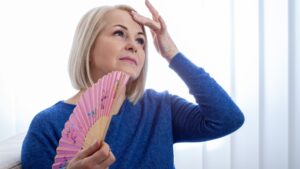 Menopause is a natural biological process that marks the end of a woman’s reproductive years. It typically occurs between the ages of 45 and 55, although it can happen earlier or later in some cases. Menopause is characterized by a decrease in the production of reproductive hormones, particularly estrogen and progesterone, by the ovaries.
Menopause is a natural biological process that marks the end of a woman’s reproductive years. It typically occurs between the ages of 45 and 55, although it can happen earlier or later in some cases. Menopause is characterized by a decrease in the production of reproductive hormones, particularly estrogen and progesterone, by the ovaries.
During the transition to menopause, known as perimenopause, a woman’s menstrual cycles may become irregular. Eventually, menstruation ceases altogether, indicating the onset of menopause. Menopause is considered complete when a woman has not had a period for 12 consecutive months.
Menopause brings about a variety of physical and emotional changes due to the hormonal fluctuations occurring in the body. These changes can vary from woman to woman, but there are some common symptoms associated with menopause. Here are a few of the most prevalent symptoms:
1. Hot flashes: Hot flashes are sudden and intense sensations of heat, often accompanied by flushing of the face, sweating, and a rapid heartbeat. They can occur both during the day and at night, leading to disrupted sleep known as night sweats.
2. Vaginal dryness: As estrogen levels decline, the vaginal tissues may become thinner, drier, and less elastic. This can cause discomfort or pain during sexual intercourse, as well as an increased risk of urinary tract infections.
3. Mood swings: Hormonal changes can contribute to mood swings, irritability, and feelings of anxiety or depression. Women may also experience difficulty concentrating and memory problems, commonly referred to as “brain fog.”
4. Sleep disturbances: Insomnia or disrupted sleep patterns are common during menopause. Night sweats, anxiety, and hormonal imbalances can all contribute to sleep disturbances.
5. Changes in sexual function: Decreased estrogen levels can affect sexual desire and arousal. Some women may experience a decrease in libido or changes in orgasm intensity.
6. Changes in the urinary system: Menopause can increase the risk of urinary incontinence or urinary tract infections. Estrogen helps maintain the elasticity and strength of the urinary tract tissues, and its decline can lead to bladder control problems.
7. Changes in the skin and hair: Estrogen helps keep the skin hydrated and elastic. As estrogen levels decrease, women may notice drier skin, increased wrinkles, and thinning hair.
8. Weight gain: Many women experience weight gain or changes in body shape during menopause. Hormonal fluctuations can affect metabolism and lead to an increase in abdominal fat.
It’s important to note that not all women experience these symptoms, and the severity and duration can vary widely. Some women may have mild symptoms that do not significantly impact their quality of life, while others may experience more intense symptoms that require medical intervention.
If menopausal symptoms are affecting your daily life, it is advisable to seek medical advice. There are various treatment options available, including hormone replacement therapy (HRT) and lifestyle modifications, to help manage the symptoms and improve overall well-being during this transition.


